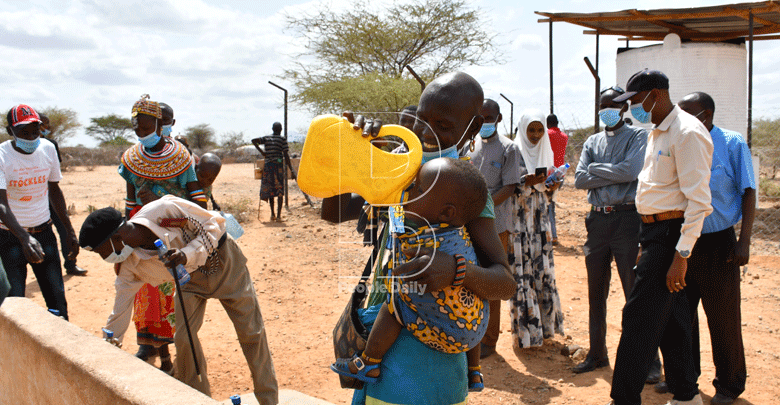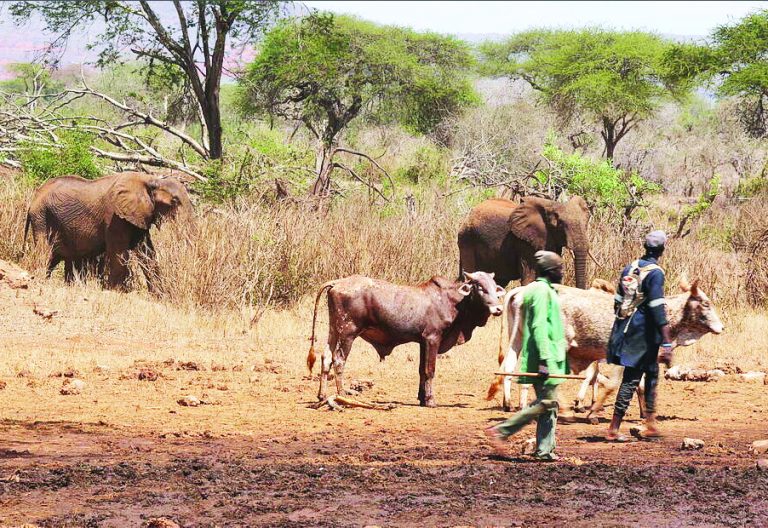Church Sh57m project quench thirst of locals

In the remote parts of Laisamis constituency, Marsabit county, the Anglican Church is transforming lives of a community that has experienced water scarcity for years.
The church, with the technical support of National Water Management Authority, through its Enhanced Access to Reliable Water Supply and Sanitation for Economic Development programme has undertaken projects that have seen over 1,000 households access potable water.
Residents have a reason to smile following successful implementation of water projects funded by the Bread for the World and UKAid at a cost of Sh57.7 million.
Anglican Development Services of Mount Kenya East (ADS-Mt Kenya East) has done piping of more than three kilometres, besides providing livestock watering troughs that also serve herders. Programme Coordinator for Marsabit Region, Dub Garbicha, said the intervention was informed by the church’s desire to assist the community in accessing clean water and mitigate poverty.
Garbicha said they were concerned because the residents were overwhelmed by water-related diseases and conflict, as they also fought for the rare commodity.
“These projects have had great impact in peace building, as availability of adequate water promotes good co-existence among these pastoralist communities,” he said. He also noted that enhancement of food security and supporting of a conducive learning environment, was also a key-driving factor.
He made the remarks during the commissioning and handing over of the projects to the community recently.
Furthermore, he pointed out that water scarcity in Marsabit was a big challenge because the largest portion of the county is arid.
A study by the organisation established that most residents have to trek long distances in search of the precious commodity.
Speaking yesterday, Garbicha said high levels of illiteracy among local women is linked to the water shortage, as girls spend their valuable time fetching water and end up dropping out of school.
Boy child is also not safe, as he has to take livestock to watering points, which are situated far away from where they attend school.
An almost tear drawing story on how pupils at two local primary schools underwent agonies of urinary tract and skin diseases owing to lack of safe water is at hand with virtually every resident.
Contaminated water
Nurse-in-Charge of Nairibi dispensary, Joseph Lemong, narrated how the facility used to be flooded with cases of learners from Nairibi and Lontolio Primary Schools, seeking treatment for uremia because of using contaminated water from saline wells.
“We used to receive many pupils here with urinary infections, with some urinating blood and stone like obstructs,” he said, adding that the problem has been addressed following the rehabilitation of a borehole that has not been functional for years after it broke down.
Lemong also disclosed that skin infections, including scabies, were a bother not only to pupils but other residents as well.
Lemong also calls for intervention on malnutrition, especially among children, lactating and expectant mothers, as the residents were now able to grow vegetables and fruits at their kitchen gardens for improved diet.
He acknowledged that the availability of water through ADS was an effective intervention against Covid-19, as residents were now able to maintain cleanliness and hygiene as advocated by the Ministry of Health.
“Given that sanitizers are hardly available in these remote areas, members of this community can now comfortably wash their hands with soap because running water is readily available,” said Lemong.
The Anglican Church of Kenya Marsabit Diocese, Bishop Wario Qampicha, who graced the occasion, called for partnership approach in addressing the water scarcity in the county.
Qampicha lauded the initiative, saying residents could now productively use their valuable time that was previously spent in walking long distances to look for water, which has now been reduced to 15 minutes to better their lives.
Households were now accessing wholesome water at a nominal fee of Sh100 per month irrespective of the amount of water one draws from the 2,800 liters per hour, yielding borehole.
“Resources are limited and this calls for partnerships and pulling of funds together by stakeholders in this sector if the water problem is to be alleviated in this county,” he noted.
Marsabit Water Resources Authority was at hand during the implementation of the programme, especially in capacity building the communities on best management and conservation of water resources and protection of the environment. – KNA








